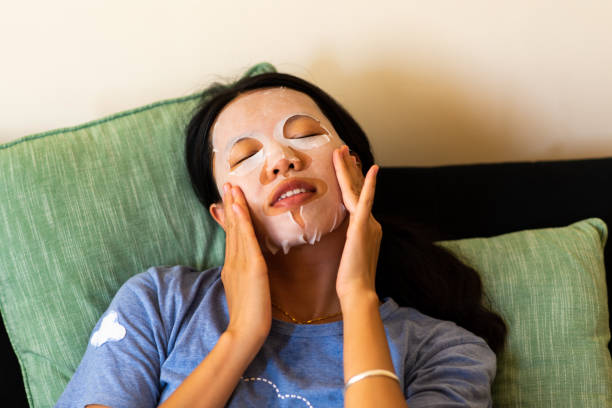The popularity of face masks in skincare routines has surged, with many people wondering if it’s safe to sleep with a face mask on. The short answer is: it depends on the type of face mask you’re using. Some masks are formulated for overnight use, while others could cause skin irritation or damage if left on too long. This blog explores the different types of face masks, their intended use, and whether it’s safe to wear them overnight.
Must Read: Best Homemade Facial Mask for Dry Skin: Natural Remedies for a Hydrated Glow
Is It Safe to Sleep with a Face Mask On?
The safety of sleeping with a face mask largely depends on the mask’s formulation. Here’s a breakdown of the most common types of face masks and whether they’re safe to use overnight:
| Mask Type | Can You Sleep with It? | Why/Why Not? |
| Overnight Masks | Yes | Formulated for overnight use to deeply hydrate and repair skin while you sleep. |
| Clay Masks | No | Can dry out the skin, causing irritation if left on too long. |
| Sheet Masks | No | Intended for short-term use; may suffocate skin if left on overnight. |
| Peel-Off Masks | No | Can damage the skin barrier if left on too long, leading to redness or peeling. |
| Hydrogel Masks | Yes, but with caution | Can be worn overnight, but may cause dryness if the gel dries out. |
| Charcoal Masks | No | Designed to detoxify; may cause excessive drying or irritation overnight. |
Understanding the Different Types of Face Masks
1. Overnight Masks
Overnight masks are specifically designed to be worn while you sleep. They are often deeply hydrating and packed with ingredients that work to repair and rejuvenate your skin as you rest. These masks are usually safe for all skin types, but it’s always best to check the ingredients for any potential irritants.

2. Clay Masks
Clay masks are fantastic for drawing out impurities and reducing oiliness, but they are not meant to be worn overnight. Leaving a clay mask on for too long can lead to excessive dryness and irritation, especially for those with sensitive skin.
3. Sheet Masks
Sheet masks are soaked in a serum that provides a quick boost of hydration. However, they are designed for short-term use (usually 15-20 minutes). Wearing a sheet mask overnight can suffocate your skin, blocking air circulation and potentially leading to breakouts.
4. Peel-Off Masks
Peel-off masks are used to remove dead skin cells and impurities from the surface of the skin. While they can leave your skin feeling fresh, leaving them on overnight can be harmful. These masks dry and tighten, and if left on too long, they can strip the skin of natural oils and damage the skin barrier.
Also Read: Skincare Face Masks for Sensitive Skin
5. Hydrogel Masks
Hydrogel masks are similar to sheet masks but are made of a gel-like material. Some hydrogel masks are safe for overnight use, especially those designed to provide long-lasting hydration. However, if the gel dries out during the night, it can lead to dryness rather than the intended hydration.
6. Charcoal Masks
Charcoal masks are effective for detoxifying the skin, but they are not suitable for overnight use. They can be overly drying and may cause irritation if left on too long, especially for those with sensitive or dry skin.
Factors to Consider When Choosing a Face Mask
If you do need to wear a mask while sleeping, here are some factors to consider:
| Factor | Importance |
| Material: Choose a soft, breathable fabric like cotton or silk. Avoid materials that are too tight or rough. | Essential |
| Fit: Ensure the mask fits snugly but comfortably. A loose-fitting mask may not provide adequate protection and can increase the risk of irritation. | Important |
| Cleaning: Wash your mask regularly with soap and water to prevent the buildup of bacteria and viruses. | Essential |
| Comfort: If you’re experiencing discomfort or difficulty breathing while wearing a mask, try adjusting the fit or choosing a different style. | Important |
Tips for Using Face Masks Safely
- Follow Instructions: Always read the instructions provided by the manufacturer. If the mask is not specifically labeled for overnight use, it’s best to remove it after the recommended time.
- Know Your Skin Type: Consider your skin type when choosing a face mask. Dry or sensitive skin types may not tolerate masks that are left on too long.
- Patch Test: Before using a new face mask, do a patch test to ensure you don’t have an adverse reaction to any ingredients.
- Moisturize Afterwards: After removing the mask, always follow up with a moisturizer to lock in the benefits and prevent dryness.
- Consult a Dermatologist: If you’re unsure about which mask is best for your skin or how long you should leave it on, consult with a dermatologist for personalized advice.
Also Read: Which Face Mask is Best for Dry Skin?
Conclusion
In conclusion, whether it’s safe to sleep with a face mask on depends on the type of mask. Overnight masks are generally safe, while clay, sheet, peel-off, and charcoal masks should not be left on overnight. Understanding the purpose of each mask and following the recommended usage is key to avoiding skin issues and maximizing the benefits of your skincare routine.
This blog content, combined with practical tips and a clear understanding of different mask types, aims to offer unique insights that will help it rank at the top of search engine results pages (SERPs) while providing valuable information to readers.



